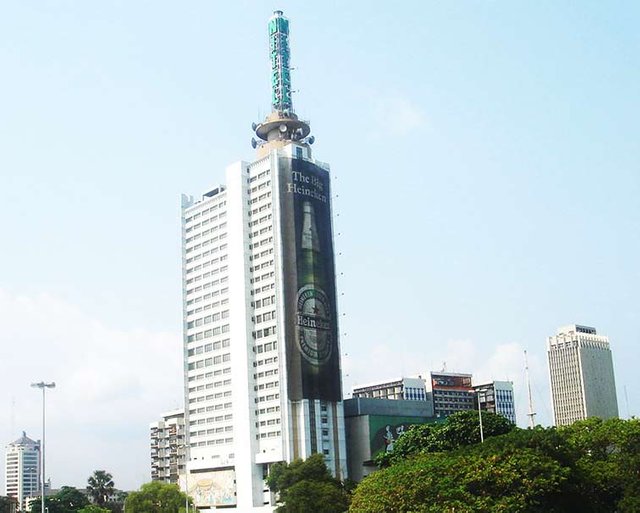
It may well be that there has been a transition from the industrial to the information society, that does not annul much of what Dr. Mahmud Modibbo Tukur, the former president of the Academic Staff Union of Universities, (ASUU) had to say in this epistle to the then Nigerian Head of State and, incidentally, the current president, Muhammadu Buhari. Is there any chance that the Buhari of today can re-read this epistle? This third excerpts from the 1984 letter concludes the series
(18). It may well be argued, Sir, that at least in certain fields the private sector is more efficient than the public sector, for all the faults of the private sector. A field which may be tempting to hold up as an example of the private sector performing better than the public sector is air- transport. In that case, I beg Government to remind the admirers of the “ efficiency” of private air charter service that (i) it is Government itself that is helping the private charters to make apparently more brisk business, through the policy of forcing the Government carrier, the Nigerian Airways, to extend its services to cover all parts of the country, even though purely commercial consideration might have dictated concentrating on certain routes, while the private charters are allowed to concentrate all their money- making activities on the more lucrative routes; (ii) that the charter companies which lease their planes from foreign Airlines are, everything considered, nothing but pipes through which Nigerian foreign exchange is drained, sometimes which is true of the Nigerian Airways also but to a far lesser extent since the latter owns 22 out of its present fleet of 25 aeroplanes: (iii) that these private air charter companies maximize their profits through “economizing” on maintenance, and by excusing themselves from taking out insurance for the lives of their passengers, “cost saving measures” which, while raking in super profits for these charters and their foreign principals, make flying with them like walking a very high- hanging tight rope “without a net”, (iv) that while Government treats the Airways as a “monopoly”- quite falsely in view of the large number of private charter companies that compete with the Airway on its most lucrative routes- and therefore impose tariffs on the Airways, no real control is exercised on the private charters, who, therefore, while going out of their way to undercut the Airways on Nigeria’s most lucrative routes, charge astronomical sums on the other, out of the ways, routes, when somebody urgently needs their services on these same routes on which the Airways is forced by Government policy to charge very low tariffs; (v) that while the Government impose what amount to political and social service function on Airways, without compensation, and while not imposing the same functions on the private charters when it comes to using Airport facilities and services, the Airways and the private charter companies are treated just the same.

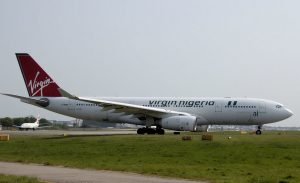
Where did it all end?
Thus, it should be clear that there is no equal competition between the Airways and the private charterers. The competition is heavily loaded against the Airway and in favour of the private charterers; and this loading of the competition against the Airways is done by the Airways’ own very owner- Government; an irony of ironies, on the surface.
(19) Nor, Sir, is the “competition” between the Nigerian Railways and road transport, which is over 95% in private hands, a free and fair competition. Thus: (i) to start with, whereas the Nigerian Railway Corporation builds and maintains its railroads, motor roads are built for the road transport owners and they use these roads frees of charge; (ii) the Railway Corporation, once again on the false assumption that it is a monopoly- which it definitely is not- has its tariffs imposed by law and these are kept very low while road transport fares are not even regulated, and keep on soaring- on a monthly basis; (iii) despite the much lower tariffs of the Railway which makes it commercially more rational to transport bulky goods by rail—despite all this- Government itself has neglected to use the services of the Railway in which in the period 1979 to 1981 alone, it invested N480 million, and instead, patronises the privately- owned road transport “services” at enormous, indeed astronomical fares; (iv) despite the fact that all countries that have developed, did so on the basis of rail and water transport , successive Nigerian Government – under the pernicious but very powerful influence of the corruptive private sector – have sunk billions of Naira into the construction of such a maze of roads as Nigeria now has while, on the one hands, forcing the Railway to stagnate where the British left them, except for the Bornu Railway Extension but, on the other hand, has both disbanded the inland waterways corporation, formerly based at Lokoja, and allowed our two major rivers each to become a series of pools and lakes, separated by huge island that were definitely not there 20 years ago and (v) Government has adopted the policy of selling petrol at much below the cost of production, a massive boom to private transport operators without at the same time regulating transport fares; a policy that has led to a disgraceful situation in which road transport fares are lower in some of the West Africa countries which import their petrol from Nigeria! Thus it is that Government policy has forced the NRC to record losses instead of profit, losses that cumulatively stood at N631.2 million by the end of 1983: a colossal sum which Government policy has forced the NRC to transfer to the private sector, through open theft, inflated contracts, grafts, and having to operate at much below optimal capacity for lack of Government patronage, which is geared towards the private sector….
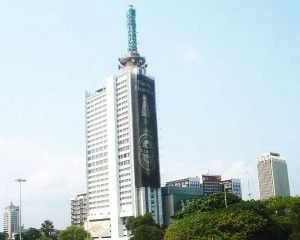
Once the pride of the Lagos skyline
(21) As for Nigerian External Telecommunications which provides the private sector with international telephone and telex links with all U.S. and West European cities; services which are available from 10 out of our 19 state capitals, in fact provides this service, whose volume jumped by 117% within 12 months alone, free of charge. I say this because in 1982 for example the NET collected only N10.00 million out of N82.00 million owned to it by the private sector; and this was a year at the end of which NET had only a total of N2.2 million in its bank accounts! A good part of the N72 million it failed to collect in 1982 was said to be owned by subscribers either whose identities could not be ascertained, or had given false addresses before making the calls! Yet, my point is that it was the private sector that, in collaboration with those in charge of the NET, duped that organization. It is this fact that makes selling the NET to the private sector, other considerations, such as national security, apart, highly unethical. It would be like rewarding open theft.
Besides it should be noted, Sir, that the NET depends on the P & T for the telephones and some other facilities that NET’s subscribers use to reach the outside world. The fact is that the P & T is so huge and cumbersome in its size and financial structure that the private sector is not proposing to grab it. Hence in the absence of a twin proposal that the would-be beneficiaries of the “privatization” of NET should also start a telephone company, and build their own earth stations, the extent to which “privatizing” NET would defraud the Federal Government, on a permanent, continuing basis, is too scandalous and mind-boggling to contemplate.
(22) Such a transaction would as a measure of the Government’s lack of business acumen be rivaled and surpassed only by the other proposal - that the Federal Government should “privatise” all the money-making undertakings of the Nigerian Ports Authority while retaining the money-consuming undertakings that yield no direct dividends; and this in spite of the fact that already by the end of 1981 the private sector was owing the NPA N74.3 million in unsettled bills! Lest I be charged with not substantiating my point about a cunningly selective “privatization” of NPA, here are the functions of the Authority that my good colleagues are recommending for “privatizing”, bless that “innocent” word:
- loading and unloading vessels;
- handing of cargo in ports;
- warehousing and dispatching of cargo and
- corresponding documentation and revenue collection;
- planning and execution (or its supervision) of port infrastructure and its maintenance;
- dredging of waterways and approach channel;
- hydrographic surveying;
- setting of rules and regulations and uniform standards for port operations;
- initiating and enforcing policies on port and cargo handling charges;
- rendering certain marine services (such as aids-to-navigation, lighthousing, harbor master services etc.);
- ensuring of and setting standards for safety and security ports;
- planning and research, monitoring port performance, keeping port and traffic statistics;
- pollution control and setting standards for it;
- manpower development and training and setting standards for it;
- representation of Nigeria in international institutions and public relations…….


(24) Sir, judging from the present economic crises and the recent orchestrated clamour of the private sector for the sale to its members of such potentially lucrative Government properties as the Airways, National Freight, NET, etc, it seems the hour has come, or at least fast approaching, for the collapse of the co-existence of a public and a private sectors in Nigeria’s economy – a co-existence that has been entirely on the private sector’s own terms and to its unshared advantage; it seems the hour has arrived or is fast approaching when one of these two sectors will have to intone the funeral dirge of the other, or at least reduce it to the position of an unmistakable subordinate. Such is the ruthless logic which the “private sector” is now willy-nilly seeking to impose on the Nigerian economy. But should things come to this, then I recommend – indeed ethics, morality and the logic of our economic history, so far, dictate – that Government should opt for the clear-cut subordination of the private sector. This is because, apart from the private sector being abysmally inefficient, poorly managed and of no profit to Nigeria – the private sector has by and large been built on the proceeds of theft from the public treasury. This could amply be demonstrated – in addition to recourse to the findings of probes into the management of various Government financial agencies – from the records of our Marketing and Development Boards which, respectively, were used to surtax this country’s peasantry and then “lend” the proceeds to a few individuals whose hands were too clean to hold a hoe. The fact of theft could also be demonstrated from a careful study of the history of the lending and loan recovery of the various banks set up by the Federal and State governments, all of which banks were set up with the proceeds of Marketing Boards or of the sale of our petroleum…Indeed when the economic history of this country comes to be written “as it was”, nobody will be left in doubt – legitimate, defensible doubt that is – about the fact that what is now so arrogantly throwing its weight about under the sign-boards of “private property” “private sector” etc is nothing but public property – i.e. common-property – masked, disguised and stood on its head.
(26) Hence if one of the present two forms of the property in the country is to be taken over and abolished by the other, then both ethics and needs of the economy demand that it is private property that should be so abolished, for the private property we see around was built up by theft from public property and is today sustained and nurtured, not by industry and hard work, but by the proceeds of further theft from public property disguised as super-profits, commissions, rents, etc; along with very generous subsidies from the public sector in the form of cheap electricity – 80% of whose bills are ignored; telephone and telex services, which, as we have seen above, are largely unpaid for by the recipients; cheap petrol and roads built and maintained by the public treasury and for which no toll is paid; and all this without bringing prices and fares down for the common people.
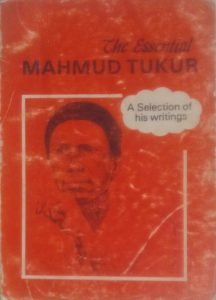
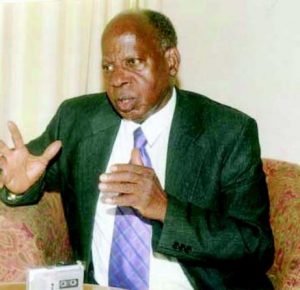
The late Prof Sam Aluko who made same argument
Yet another very significant way in which public enterprises are made to subsidise private enterprise is by public sector being used as an on-the-job training ground for private sector managers and technicians, who on graduation at the end of an educational career financed with public money, first take up jobs in the public sector; work there for some years; make all the mistakes associated with the transition from theory to practice; gain experience; and are then snatched by the private sector, which offers them much better service condition. In fact it is largely in order to facilitate his brain drain from the public sector to the private sector that the neo-colonial policy of keeping the conditions of civil servants and managers of Government parastatals very austere and frugal and their future bleak when compared to those offered in the private sector is maintained, a policy enforced by people who may be in the public sector but whose loyalties are with the private sector where they themselves hope to “retire” after making an initial capital through abuse of office; after gaining administrative experience; and after making the correct business connections through their official duty intercourse, which, indeed among other things they may use to serve and patronize the private sector, from which they hope later to collect deferred rewards. Worse still, of recent whereas the private sector is treated as a sacred preserve into whose workings Government and its agencies should not pry, private sector practitioners, including men who have spent all their lives unquestioningly serving foreign multinationals have been given ever greater control over the public sector by being appointed on to the latter’s board of directors, being appointed members of commissions of enquiry into the working of Government enterprises and being made Ministers, Commissioners and Special Advisers; all this while they have not severed their links with the private sector, except, perhaps, in a purely formal and highly legalistic sense.
(27) Indeed and morality apart, it is NOT in the interest even of private property itself that public property should disappear; for private property – to the extent that it is owned by “Nigerian citizens” – cannot survive public property by any length of time. Abolishing public property will, for private property, be like the proverbial case of killing the goose that lays the golden eggs. In this sense then, private property is itself hostage to public property. Thanks be to Allah!
(29) Furthermore, Sir, the assault on public property being proposed by the other members of the Study Group, which is, perhaps more unwittingly than wittingly, acting on behalf of private interest, is nothing but a prelude to the outright sale of Nigeria to foreign interests: The proverbial lack of patriotism of Nigerian businessmen apart, the truth of the matter is that Nigeria, as of now, is part and parcel of the capitalist world dominated by the United States; but Nigeria is a weak peripheral part of that capitalist world, nonetheless; and the “universal law” of the capital world is “competition” in which success in any given contest goes to the stronger competitor, even though this “victor” too, will, in his own turn, be defeated in another competition, by a still stronger and more unscrupulous rival. This universal – real jungle – “law” of the capitalist world, “competition”, knows no international boundaries; knows no sovereignty of nations; and knows no tariffs walls, however “high”. For these “higher” tariff “walls” are easily knocked down by cajoling, threats and blackmail at the conference table, e.g. During negotiations for IMF loans, during which the “liberalization” of trade is demanded as a “minimal condition”; or at a country’s often very porous, borders, through bribery and blackmail. Now, then, Sir, whereas for the metropolitan countries of this anti-social “world” with its system of “each against everybody else”, there do exist private capitalist corporations of sufficient economic clout and experience in the “tricks of the game” to withstand and defeat all competition from others, whether internal or external, in the peripheral countries – Nigeria inclusive – the only capitalist that have the slightest chance of holding their own against the metropolitan corporations and their multinational subsidiaries are Governments Incorporated: It is the latter that, on the one hand, invest the economies of these peripheral countries with a measure of autonomy, however small, and on the other hand, through their direct ownership of substantial property, provide the conceited “private sector” some cushion against the mighty blows of the metropolitan corporations and their multinational subsidiaries. Hence when the “private sector”, in a fit of childishness, seeks to destroy this autonomy and this cushion, such as the over-pampered “private sector” in this country has been trying to do in the last 24 months or so, a responsible Government should firmly tell it “No, You shall not” just as a responsible parent would tell a child threatening to put the family house on fire. After rejecting privatization what do I recommend?
Posted from my blog with SteemPress : https://intervention.ng/15761/